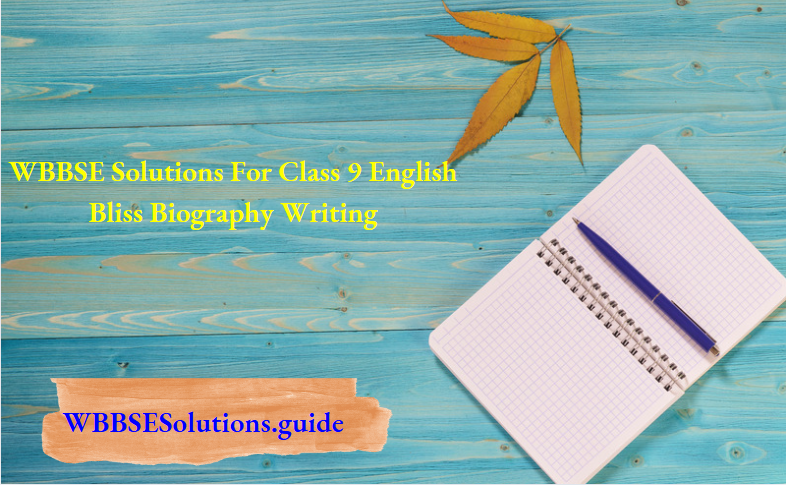Biography Writing
Question 1. Write a biography on Dr. Rajendra Prasad, the 1st President of India. Use the following points:- (In 100 words)
Born in 1884 – village of Bihar – early education from district school – went to Calcutta (Now Kolkata) – stood 1st in all exams – lawyer at Calcutta High Court – joined politics with Gandhiji-elected President of Indian National Congress.
Answer:
Biography Of Dr. Rajendra Prasad
Dr. Rajendra Prasad was born in 1884 in a small village in Bihar. He received his early education in his own district. Then he went to Calcutta. He always stood first in all examinations.
Dr. Rajendra Prasad started his practice at Calcutta High Court. He came to Patna for his practice. He was a very successful lawyer. He loved his motherland and he decided to devote all his time to its service.
Dr. Rajendra Prasad joined the freedom movement with Gandhiji. He took an active part in the movement. He began to work under the guidance of Gandhiji.
Read and Learn More WBBSE Solutions for Class 9 English Bliss
Dr. Rajendra Prasad was elected President of free India in 1947. Dr. Prasad was elected President of the Indian Union.
Question 2. Study the following points and write a short biographical sketch of ‘William Shakespeare’, the greatest of English dramatists.
Points:
Birth: 23rd April 1564 at Startford-on-Avon, England.
Parentage: John Shakespeare and Mary Arden.
Education: Stratford Grammar School.
Wife: Anne Hathaway.
Creations: Sonnets, dramas.
Comedies: ‘As you Like It’, Merchant of Venice’, ‘Twelfth Night’, ‘Much Ado about Nothing’, etc.
Tragedies: ‘Macbeth’, ‘Hamlet’, ‘Othello’, ‘King Lear’.
Death: 23rd April 1616.
Answer:
William Shakespeare
William Shakespeare was a great poet and the greatest of English dramatists. He may have been born at Startford-on-Avon on 23rd April 1564 which happens also to be the date of his death in 1616. John Shakespeare and Mary Arden were his proud parents.
Little Shakespeare attended the grammar school of the tiny town and according to Ben Johnson, he knew “small Latin and less Greek”. William married a certain Anne Halthway of Stratford. At this time the groom was only eighteen and the bride eight years older.
In 1584 Shakespeare left his native town and wandered through the country for fortunes and in 1592 he finally appeared as a rising actor in the theatres of London.
He was attached to a leading company of actors. He was a good if not a great actor. His chief function was to write dramas for his company and the fruit of such labor was his immortal plays.
He wrote thirty-eight dramas in all. Of his great comedies, ‘As You Like It,’ ‘Merchant of Venice’, ‘Twelfth Night’, ‘Much Ado About Nothing’, etc.
deserve or merit mention. ‘Macbeth’, ‘King Lear’, ‘Hamlet’ and ‘Othello’ are some of the great Shakespearean tragedies. Shakespeare was no mean poet.
He wrote 154 great sonnets and numerous lyrics that are scattered throughout his plays. If Shakespeare had not been the greatest English dramatist, he would still be numbered among the greatest lyrical poets of the language.
This literary giant and genius breathed his last on 23rd April 1616. “He was the man,” said Dryden, “who of all modern and perhaps ancient poets, had the largest and most comprehensive soul”.

Class 9 English Biography Writing WBBSE Important Questions
Question 3. Write a short biography on Abanindranath Tagore using the following points:
Birth: At Jorasanko, Calcutta in 1871
Father: Gunendranath Tagore
Family background: Rich and cultured Tagore family
Education: Leamt foreign languages and Sanskrit at home under private tutors. Westem Art from Gilardy and Pummer. Japanese art form Taikan.
Famous creations: Krishnalila, Buddha and Sujata, Omar Khaiam’s Pictures, etc.
Books: Kshirer Putul, Shakuntala, Raj Kahini, Nalok, etc.
Death: In 1951
Answer:
Abanindranath Tagore
Abanindranath was one of the finest painters India has ever produced. He was born in Jorasanko, Calcutta in 1871.
Gunendranath was his father. Abanindranath inherited the 237 rich cultural background of the Tagore family. He learned foreign languages and Sanskrit at home under private tutors.
He learned western art from the great art teachers named Gilardy and Pummer, and Japanese art from Taikan. Abanindranath Tagore made many wonderful artistic creations.
Of these mention must be made of ‘Krishnalila,’ ‘Buddha and Sujata’, Omar Khaiam’s Pictures, and others. Abanindranath not only excelled in painting but also made a great contribution to the field of literature.
He is famous for his literary creations like ‘Kshirer Putul’, ‘Shakuntala,’ ‘Raj Kahini’, ‘Nalok’ etc. This outstanding painter passed away in 1951. But we can never forget his wonderful contribution as a painter.
WBBSE Class 9 English Bliss Biography Writing Solved Exercises
Question 4. Study the following information about an eminent artist and painter, Nandalal Bose to write a short biographical sketch within 150 words:
Born: 3rd December 1882 at Kharagpur
Parents: Purnachandra Bose and Kshetramoni Devi
1902: Passed Entrance Exam
1905: Admitted to Govt. Art School, Calcutta
1909: Came in close contact with Rabindranath
1919: Teaching at Kala Bhavan, the Art Department of Visva Bharati
1922: Adhyaksha, Kala Bhavan
1951: Retired from Kala Bhavan
Contributions: Paintings like ‘Sati mounting the pyre’, ‘Krishna and Ajuna’, and ‘Veena player’, illustrated ‘Sahaj Path’ of Tagore.
Honors: Degree of D. Litt. from B.H.U., 1950; Desikottam from Visva Bharati 1950; Fellow of Lalit Kala Academy, 1956; Degree of D. Litt. from C.U., 1957
Died: 16th April 1966.
Answer:
Nandalal Bose
An eminent artist and painter, Nandalal Bose was born on December 3, 1882, in Kharagpur. Purnachandra Bose was his father and Kshetramoni Devi, mother.
Nandalal passed the Entrance Exam in 1902 and was admitted to the Govt. Art School, Calcutta in 1905. Then in 1909, he came in close contact with Rabindranath at Shantiniketan.
He started teaching at the Kala Bhavan, the Art Department of Visva Bharti in 1919, and later in 1922 became its Adhyaksha. He ultimately retired from it in 1951.
His paintings like ‘Sati mounting the pyre’, ‘Krishna and Arjuna’, ‘Veena Player’, and illustrated ‘Sahaj-Path’ of Tagore are some of his outstanding artistic creations.
Honors were showered upon him. He got the Degree of D.Litt. from the Benaras Hindu University in 1950 and from the Calcutta University in 1957.
He was awarded ‘Desikottam’ from the Visva Bharati University in 1950 and elected Fellow of Lalit Kala Academy in 1956. Nandalal breathed his last on 16th April 1966. His death created a vacuum in the world of art and painting in India.
Question 5. Write in about 150 words a biography on Satyajit Ray, the great film-maker on the basis of the points given below:
Date of birth: 2nd May 1921
Place of birth: Garparh in Calcutta
Parentage: Sukumar Ray-Suprabha Ray
Versatility: Painter, writer, filmmaker, musician, etc.
1955: ‘Pather Panchali’
1957: His second film was awarded at the Venice Film Festival
1982: Homage to Satyajit Ray, Cannes Film Festival
1992: Oscar for lifetime achievement Bharat Ratna
Death: April 23, 1992, after a three-month battle with cardiac illness.
Answer:
Satyajit Ray
Satyajit Ray, one of the finest filmmakers in the world, was born to Sukumar Ray and Suprabha Devi on 2nd May 1921 at Garparh in Calcutta.
Both his father and grandfather were great Bengali litterateurs. Satyajit Ray was a man of versatile genius. He was a writer, musician, painter, director of films, and whatnot.
But it is mainly as a maker of films that Ray is known to us and to the world. He started with ‘Pather Panchali’ in 1955 and it was immediately a great and grand success.
In 1957 his second film was awarded at the Venice Film Festival. He made many more good films that delighted people around the globe.
At the Cannes Film Festival, rich tributes were paid to the genius of Satyajit Ray. He was honored with an Oscar, the highest film award for his wonderful contribution to the world of films in 1992.
And this was followed by Bharat Ratna, the country’s highest civilian award given by the Government of India. This great filmmaker died on April 23, 1992, after a prolonged three-month battle with cardiac illness. His death has created a big vacuum in the field of films.
WBBSE Class 9 English Bliss Biography Writing Solutions
Question 6. Write a biography (within 100 words) on Mahasweta Devi, the great Bengali litterateur, on basis of the points given below:
Date and place of birth: January 14, 1926, in Dhaka (now in Bangladesh)
Parents: Manish Ghatak and Dharitri Devi
Education: H.S. in Dhaka, B.A. from Visva Bharati, MA from Calcutta University.
First Publication: “Jhansir Rani’, 1956.
Service: As a lecturer of English literature at Bijoygarh College. 1965
First visit to tribal areas:1965
Literary Works: Andhar Manik, Nei Nagarer Sei Raja, Arannayer Adhikar, Hajar Churashir Ma, Rudali, Sidhu Kanuhur Dakey, etc.
Features of her style: Chronicled the life and times of the children of a lesser god: Used her pen to voice the sufferings of the tribals and poor villagers.
Awards: Sahitya Academy Award for Arrannayer Adhikar(1979), Jnanpith Award (1991), Ramon Magsaysay Award (1997),Padma Bibhushan (2006)
Death: 28 July 2016
Answer:
Mahasweta Devi
Mahasweta Devi is an eminent writer of modern Bengali literature. She was also a social activist. She was born on 14th January 1926 in Dacca, Bangladesh.
Her father was Manish Ghatak and Dharitri Devi was her mother. She graduated from Santiniketan in 1946 with honors in English and had her master’s from Calcutta University in 1963.
She was married to famous actor-director-writer Bijon Bhattacharya. Mahasweta did different kinds of jobs. In 1964 she joined Bijoygarh jyotish Roy college as a professor.
She also worked as a journalist. Her first book in print was ‘Queen of Jhansi’ and her first novel was ‘Nati’. Soon Mahasweta discovered her latent talent in creative art.
And we are fortunate to enjoy some powerful and original works like ‘Andhar Manik’, Hajar Cherisher Ma’, ‘Aranyer Adhikar’, ‘Titumir’ etc. Aranyer Adhikar or the ‘Rights to the Forests’ has been translated into many languages of the world.
All these works reflect Mahasweta’s genuine love for the tribal people and respect for their culture. Mahasweta waged a relentless war to establish the rights of the ‘Sabers’ and other ethnic groups.
She used her ink to acquaint us with their blood and sweat, toil and tears. Mahasweta died on 28th July 2006. The grand old lady of legendary literary stature left us forever. But her voice will never be silent.
Biography Writing Class 9 WBBSE Short And Long Examples
Question 7. Write a biography of Maulana Abdul Kalam Azad (within 100 words) based on the hints given below:
Hints: Born on 11 November 1888-composed poetry in Urdu-worked as a journalist, protested against the British Raj – was an enthusiastic supporter of Gandhiji’s ideas-wrote many books like ‘India wins freedom’, ‘Ghubar-e-Khatir’, etc.-first Education Minister of independent India – birthday celebrated as National Education Day – died on 22 February 1958.
Maulana Abdul Kalam Azad
Maulana Abdul Kalam Azad, a versatile genius, is known to us as a great freedom fighter. His contribution to India’s freedom movement is unforgettable.
He was born on 11 November 1888. He worked as a journalist for a long time. He composed poetry in Urdu. In everything, he continued his protest against the British Raj.
He was a great and enthusiastic follower of Gandhiji and his philosophy. He wrote many books voicing his protest against the British. Some of them are ‘India wins freedom’, ‘Ghubar-e-Khatir’ etc.
After independence, he became the first Education Minister of India. Now his birthday is observed as National Education Day. Unfortunately, we lost him forever on 22 February 1958. 8. Write a biography on Surya Sen based on the following points (in 150 words):
Place of Birth: Noyapara, Chittagong
Date of birth: March 22, 1894
Parentage: Rajmoni Sen, Shashibala
Early education: At village primary school and high school
Passed: B.A. from Berhampore college
Joined: High School as Mathematics teacher. Non-Cooperation movement in 1921. A great patriot: Put in jail so many times, founded Indian Republican Army in 1928, attacked the British arsenal at Chittagong in 1930, fought bravely, was caught by the English in 1933, and jailed on 12th January 1934.
Death: Hanged to death.
Surya Sen
Surya Sen was a great patriot of India. He was born at Noyapara of Chittagong, now in Bangladesh on March 22, 1864. Rajmoni Sen was his father and the name of his mother was Shashibala.
Surya Sen received his early education at the village primary school and high school respectively. He passed the B.A. Exam. from Berhampore College.
Then he joined a High School as a Mathematics teacher. ‘Masterda’ as Surya Sen was popularly called, joined in the Non-Cooperation Movement led by Mahatma Gandhi in 1921.
A great patriot as he was, was put in jail on a number of occasions. ‘Masterda’ founded the Indian Republican Army in 1928 and attacked the British arsenal at Chittagong in 1930.
The army fought bravely against the strong British army. Surya Sen was caught by the English in 1933 and jailed. He was sentenced to death on 12th January 1934. The ideals of Surya Sen inspired hundreds of freedom fighters in India.
Biography Writing Class 9 WBBSE Question Answers
Question 9. Study the following points and write a paragraph on Sourav Ganguly:
Birth: 8th July
Parents: Chandi Ganguly and Nirupa Ganguly
Education: Schooling and college education from St. Xavier’s School and College in Calcutta.
Coaching: By Debu Mitra, Gopal Bose & others.
Source of inspiration: From his parents and elder brother.
As a Cricketer: Played their first Ranji match against Delhi in 1991, was selected for the Australia tour of the Indian cricket team, and played only One Day Match, in 1992. Double centuries at Lord’s in 1996.
Test Performance: Highest score 173 against Sri Lanka at Mumbai, batting average about 50.
Sourav Ganguly
Sourav Ganguly is the most popular cricketer in Bengal and one of the match-winning cricketers in the present Indian cricket team. Sourav was born on 8th July 1972 to Chandi and Nirupa Ganguly.
He is nick-named ‘Maharaj’. Sourav had his schooling and college education at St. Xavier’s School and College in Calcutta. He was coached by Debu Mitra, Gopal Bose, and others. His elder brother Snehasish Ganguly was a good Ranji Trophy player for Bengal.
Sourav played in the Ranji Trophy for the first time against Delhi in 1991. Ganguly was selected in the Indian team for the tour of Australia in 1992 and played in only one Day International match.
Ganguly made his debut against England at Lord’s on 20th June 1996 and scored a hundred. His highest Test score is 173 against Sri Lanka in Mumbai and his batting average is above 50.
Ganguly is more successful in One Day Cricket. He has played some match-winning innings for his country in Karachi, Dhaka, Sharjah, and Toronto. His highest score is 183 against Sri Lanka.
He is also a very useful bowler and a good fielder. Sourav Ganguly has really made his mark in Indian Cricket and he is likely to serve it for a long time to come.
Question 10. Study the information given and develop a meaningful paragraph from it. Also, suggest a suitable title for the write-up:
Name: Rabindranath Tagore
Date of birth: 1861
Place of birth: Jorasanko, Kolkata
Father’s Name: Maharshi Debendranath Tagore
Family background: Very rich, cultured, landlord family
Early visits abroad: Went to England several times in childhood
First Opera: Bhanu Singher Padabali
Started composing: From early childhood
Nobel Prize: On the Geetanjali in 1913
His greatest creation: Shantiniketan
Name of his wife: Mrinalini Devi
Works: Novels, short stories, dramas, poems
Other fields of activity: A great supporter of nationalist movements, international brotherhood, and equality among mankind
Death: 1941
Rabindranath Tagore
Rabindranath Tagore, one of the greatest sons of India, was born in a very rich, cultured landlord family at Jorasanko, Kolkata in 1861. His father’s name was Maharshi Debendranath Tagore.
He went to England several times in his early childhood. His potential as a great composer and writer was evident from early childhood.
His first opera, Bhanu Singher Padabali, created a sensation. He was married to Mrinalini Devi who inspired him to pursue his work on dramas, novels, short stories, poems, etc.
His most brilliant work was Geetanjali for which he was awarded the Nobel Prize in literature in 1913. However, his greatest creation was Shantiniketan at Bolepur.
He was not only a great writer but also a great supporter of the nationalist movement. He also worked for international understanding and advocated equality among mankind. He died at the age of 80 in 1941.
WBBSE Class 9 English Bliss Biography Writing Examples
Question 11. Write a biography of Amartya Sen using the following points:
Points: Birth: 3rd November, 1933-Place: Bangladesh-Parents: Prof. Asutosh Sen and Mrs. Amita Sen-Education: Shantiniketan, Presidency College, Calcutta University, Ph.D.
from Cambridge-Service: Prof. in Jadavpur University from 1956-58, taught at Delhi University, London School of Economics and Oxford University-Awards: Nobel Prize in Economics, 1998-Noted Books: “Growth Economics, 1970”, “On Economic Inequality, 1973”, “Poverty and Famines, 1981”.
Amartya Sen
Our country has produced a lot of great personalities. Amartya Sen is one of them. Amartya Sen, a great economist, was born in present Bangladesh on 30th November 1933.
Prof Asutosh Sen and Mrs. Amita Sen were his parents. He had his early education at Shantiniketan and then at Presidency College and Calcutta University.
He completed his Ph.D. at Cambridge and joined as a Prof. of Economics at Jadavpur University. This great economist has taught at Delhi University, the London School of Economics, Oxford University, Harvard University, and Trinity College, Cambridge.
He is a great scholar and thinker. He is the first Asian Nobel Laureate in Economics (1998). He wrote many books on Welfare Economics.
Some of his notable books are “Growth Economics” (1970), “On Economic Inequality” (1973), “Poverty and Famines” (1981), etc. It is due to him that India is trying to achieve wonderful feats in the field of Welfare Economics.
We are really proud of this renowned personality.
Question 12. Write a biography of APJ Abdul Kalam using the following points:
Points: Date and place of birth: 1931, Rameswaram in Tamil Nadu-Parents: Jainulabdeen, a pious Muslim, and Ashiamma-Education: School of Rameshwaram,
Madras Institute of Technology-service: Trainee in Hindustan Aeronautics, worked in NASA and GSFC, Maryland-Achievements: Played key role in India’s first rocket launching in 1965, the leader in launching satellites SLV-3 in 1980, Director of DRDL in 1982,
Awards: Padma Bhushan, Bharat Ratna-ex-President of India (2003-2008), loved children and education Soul rests in peace: 27th July 2015.
Bharat Ratna, Apj Abdul Kalam
APJ Abdul Kalam, the great scientist and one of the finest men of modern India, was a ‘Ratna’, a jewel of India. He was popularly called the ‘Missile Man’.
As the eleventh president of India, he won the hearts of the people. He was the people’s president. He was born in Rameshwaram, Tamil Nadu on 15th October 1931.
His father Jainulabdeen was a pious person and his mother Ashiamma was a homemaker. His early education started in a school at Rameshwaram.
Then he was admitted to the Madras Institute of Technology. He played a key role in India’s first-ever rocket launching in 1965. He was the leader of the nuclear explosion experiment at Pokhran in 1988.
He guided the launching of the surface-to-surface missiles ‘Trisul’, ‘Akash’, and ‘Agni’. He received the ‘Padma Bhushan’ and the ‘Bharat Ratna’, the highest civilian award in India.
He wrote many books including ‘Wings of Fire’, his autobiography. He left his mortal body on 27 July 2015. But his ideal will surely guide us towards his dream destination-India as a knowledge superpower.
Question 13. Write a biography of Manna Dey using the following points:
Points:
Date and place of birth: 1 May 1919, Madanmohan Ghosh Lane, Kolkata- Parents Purna Chandra Dey and Mahamaya Devi-Education: Indubabu’s Pathsala, Scottish Church Collegiate School,
Vidyasagar College-Inspiration: Uncle Krishna Chandra Dey Career: First duet in the film ‘Tamanna’ (1967), ‘Chowringhee’ (1968), etc.-Speciality: Classical and semi-classical songs-
Awards: Padmashree (1971), Filmfare Award (1972), Padmabhusan (2004), Dada Saheb Phalke (2007), and Bangabibhusan (2011)-Breathed his last: 24 Oct 2013, Bengaluru.
Melody King Manna Dey
Thanks to Manna Dey for ‘Manna Dey’ and ‘Melody’ remained synonymous for almost fifty years in our country. This great maestro was born on 1st May 1919 in his ancestral house at 9, Madanmohan Ghosh Lane, Kolkata.
His parents were Purna Chandra Dey and Mahamaya Devi. He got his early education at Indubabu’s Pathsala. After leaving Pathsala he joined Scottish Church Collegiate School.
He completed his graduation from Vidyasagar College. His uncle Krishna Chandra Dey inspired him to take up singing as a profession.
The melodious journey of his life began with a duet song in the film ‘Tamanna’ in the year 1943. After that, he gave us many hits and popular film songs.
His modern Bengali songs were equally popular. People still become mesmerized when they listen to ‘Coffee-Houser Sei Addata Aaj Aar Nei’, ‘Se Aamar Choto Bone’, ‘Aamay Ektu Jayaga Dao’, etc.
He was awarded Padmashree, Filmfare, Padmabhusan, Dadasaheb Phalke, and Bangabibhusan. He left us for his heavenly abode on 24th October 2013.
Class 9 WBBSE English Biography Writing Format
Question 14. On the basis of the following points write a short biography of R. K. Laxman :
Points:
Birth date and place: 24th October 1921 in Mysore, Karnataka;-Name: R.K. Laxaman Brother: R.K. Narayan, one of India’s best-known English language novelists-
Field of work: Cartoonist, illustrator, humanist-Worked in Swarajya, Blitz, The Hindu, 243 Times of India-Famous work: ‘The Common Man’, ‘Gattu’ in the advertisement of Asian Paints;
Awards and Honours: Padmabhushan, Padma Vibhushan, Ramon Magsaysay Award-Autobigraphy: The Tunnel of Time;-Death: 26th January 2015 in Pune.
R. K. Laxman, The Common Man
Rasipuram Krishnaswami Laxman was a cartoonist with a difference. Ordinary Indians could identify themselves with his cartoon character, ‘The Common Man’.
He was born on 24th Oct. 1921 in Mysore, Karnataka. One of his brothers is R.K. Narayan, India’s one of best known English language novelists. Laxman was a cartoonist, illustrator, and humanist as well.
He worked in different magazines and newspapers like the Swarajya, the Blitz, the Hindu, The Times of India, etc. He started a daily cartoon strip titled ‘You Said it’s in the Times of India in 1951.
It made him very popular. His ‘Gattu’, another cartoon character, is seen in the advertisement of Asian Paints even today. Laxman received Padmabhushan, Padma Vibhushan, and Ramon Magsaysay Awards.
He penned his autobiography titled ‘The Tunnel of Time’. On 26th January 2015, he died in Pune at the age of 93. It is significantly coincidental that the creator of ‘The Common Man’ passed away on Republic Day.
Question 15. On the basis of the following points write a short biography of Raja Rammohan Roy. Points:
Birth: 22nd May 1772 at Radhanagar in Hooghly-Parents: Ramakanta Roy and Tarini Devi-Education: Learnt Arabian, French, Sanskrit, and English, read many religious books quite
early-Service: Joined East India Company-Social Reformer: Fought against superstition, abolished ‘satidaha’, the foundation of Brahma Dharma-Honours: Rabindranath titled him
‘Bharat Pathik’ and British Government ‘Raja’ – Death: 27th September 1833 at Bristol.
Raja Rammohan Roy
Raja Rammohan Roy was the pioneer of the Renaissance in Bengal. He is called the First modern man of India’. He was born on 22nd May 1772 at Radhanagar in the district of Hooghly. His parents were Ramakanta Roy and Tarini Devi.
He learned several languages like Arabian, French, Sanskrit, and English at an early age. He also read many religious scriptures quite early.
Rammohan had command over several European languages and literature. He started his service career with the East India Company. Then he came to Calcutta and devoted himself to several welfare activities.
He fought against the existing superstitions and dogmatism and injustices in contemporary Indian society. He tried to abolish many evil social customs like ‘Sati Daha’.
He was the founder of Brahma Dharma. Rabindranath gave him the title ‘Bharat Pathik’ and the British Government ‘Raja’. This great social thinker and reformer passed away in Bristol on 27th September 1833 at an early age.
Class 9 English Biography Writing WBBSE Notes
Question 16. On the basis of the following points write a short biography of Vidyasagar.
Points:
Parents-Thakurdas Bandyopadhyay and Bhagabati Devi-born on 26th Septem- ber, 1820 at Birmingham in Midnapore Admitted to Sanskrit College,
Calcutta at the age of nine-stood first all along – passed the Hindu Law Exam., and was awarded the ‘Vidyasagar’ title-Joined Fort William College as a professor, Bengali Deptt. – later Joined
Sanskrit College became Principal- resigned–established Metropolitan Institution – took a leading role in spreading education, especially in rural areas and for
Females wrote “Barna Parichaya “, “Bodhoday”, etc. – Influenced the British Govt. – Act for Hindu Widow Remarriage-prevention of early marriage – Death: July 29, 1891.
Vidyasagar
Pandit Iswar Chandra Vidyasagar, a great son of Bengal as well as of India, was born to Thakurdas Bandyopadhyay and Bhagabati Devi.
He was born on 26th September 1820 in Birmingham in the district of Midnapore. When he had finished his primary education at the village ‘pathshala’, he was admitted to Sanskrit College, Calcutta at the age of only nine.
Young Iswar Chandra was very talented and intelligent. He secured the first position in the class throughout his academic career. He had the Hindu Law Examination.
Passed with great credit. For his profound knowledge, he was awarded the ‘Vidyasagar’ title. Vidyasagar joined Fort William College as a professor in the Bengali Department.
Then he became a professor and later Principal of Sanskrit College. Vidyasagar resigned from the college and established the Metropolitan Institution.
He took a leading role in spreading education especially in the countryside and among women. He wrote many books like “Bama Parichaya” and “Bodhoday”, to name only a few.
Vidyasagar influenced the British Govt. to introduce the Act for Hindu Widow Remarriage. He also did a lot to prevent child marriage. This great scholar, educationist, and social reformer breathed his last on July 29, 1891.
Question 17. On the basis of the following points write a short biography of Swami Vivekananda.
Points:
Birth: January 12, 1863, at Simla in Calcutta.
Parents: Biswanath Dutta and Bhubaneswari Devi
Names: Narendranath; Pet name-Bile
Childhood: Naughty and restless; Courageous At home; Metropolitan School; Presidency College and General Assemblies Institution
Education: Monastic Life: Met Sri Ramakrishna and became his disciple; known as Swami Vivekananda
Achievements: Participation in the Parliament of Religions at Chicago in 1893; Founded Ramakrishna Math and Misson at Belur, in 1898
Death: July 4, 1902.
Swami Vivekananda
Swami Vivekananda, the cyclonic Hindu monk of India, was born on January 12, 1863, at Simla in Calcutta. Biswanath Dutta and Bhubaneswari Devi were his parents.
His real name was Narendranath, while Bile was his pet or nickname. Bile was very naughty and restless but very bold and brave in his childhood.
He had his early education at home and school education at the Metropolitan School. Then he was admitted to the Presidency College and later to the General Assemblies Institution.
At this time, young Narendranath heard about Sri Ramakrishna and met him at Dakshineswar. He was tremendously influenced by him and became his great disciple by renouncing the world.
He was known as Swami Vivekananda. Then after the death of his Master, he went to America to join the Parliament of Religions held in Chicago in 1893.
Swamiji lectured on Vedanta there and gradually captured the hearts of the people of the whole world. He came back to India and founded the Ramakrishna Math and Mission at Belur in 1898 for the service of suffering humanity.
This great prophet and patriot of India died on July 4, 1902. But his great ideas and ideals will never die.











